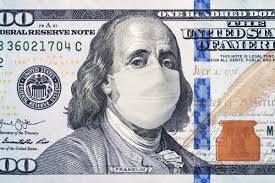The Coronavirus Pandemic is More Than a Health Crisis
Presented by: Matthew A. Clayson

The coronavirus pandemic is more than a public health crisis. It’s an economic wrecking ball. Since the first reported cases in early 2020, COVID-19 has induced both a global recession and a record setting recovery. It contributed to the highest U.S. unemployment rate since the Great Depression, causing businesses to falter and families to face financial hardship.
Stocks have experienced a wild ride. The pandemic initially wiped out more than $11 trillion of wealth, but Wall Street quickly stabilized as lockdowns lifted and vaccines were introduced, hitting an all-time high in January 2022. But investors now fear a new threat: the surge in “Covid inflation” caused largely by ongoing supply chain disruptions. Against the backdrop of economic uncertainty, it’s not yet clear how long it may take for households hit hardest by the pandemic to get back on their feet financially, but we do know from past experience with economic crises that there are steps families can take today to potentially restore their financial wellness faster.
Those steps include:
Staying calm
If you contribute to a retirement plan or invest in a brokerage account, your future account balance depends on what you do right now. So, avoid making moves based on emotion rather than rational planning.
If you already have a retirement savings program under way, with asset allocation appropriate to your risk profile and long-term goals, you probably want to continue following your plan. Guidance from a trusted financial professional is can also be key.
Paying off credit cards
When the COVID-19 crisis is over and you’re back at work, you’ll need to begin paying down any debt you incurred, which includes credit card bills and retirement account loans.
One way to rid yourself of debt faster is to use any tax refunds you receive to that end. Bonuses and annual raises from your employer may be in short supply this year, but as the economy recovers and your compensation (hopefully) climbs, you may also be able to use that extra income to pare down debt.
More immediately, explore opportunities to trim waste from your budget—including unused gym memberships, premium cell phone plans, dinners out, etc.—and direct those savings to reduce the amount you owe.
Start by paying off the debt that costs you the most. Generally, that means credit cards balances. Many charge interest of 18% or higher, which makes it difficult to dig out and limits your ability to fund other financial goals.
Repaying your retirement account loans
If you took advantage of government leniency and tapped into your retirement savings to help make ends meet, you should also do everything you can to make yourself whole.
Considering a refi
If you’re strapped for cash, you might also consider refinancing your loans to lower your monthly payments.
For example, it might make sense to refinance your mortgage loan if you plan to remain in your home for at least five more years. Depending on your financial picture, however, it could be wise to refi if you can lower your interest rate by even 1 percent, especially if helps you to eliminate paying private mortgage insurance because the equity in your home has reached 20 percent. Be aware, however, that if you turn the clock back on the term of your loan, say, starting it over at 30 years, you will likely pay more in interest over the life of the loan, despite the lower monthly payment.
Insulating yourself for next time
No one knows yet when the COVID-19 crisis with its variants will end, but we can safely assume it will not be the last financial crisis we face.
As you take steps to restore your financial well-being today, don’t forget to insulate your finances for tomorrow.
If you don’t already have one, start putting money away for an emergency fund to pay the bills during bouts with unemployment, or when unexpected expenses crop up such as home repairs and medical bills. Having savings set aside prevents you from having to rely on credit cards or drain your retirement account in a pinch.
Most financial professionals suggest setting aside at least three to six months’ worth of living expenses in a liquid, interest-bearing account.
You should also review your insurance coverage to be sure that your family is protected no matter what. Beyond basic health insurance, you may wish to consider life insurance to protect your loved ones in the event that you should pass away prematurely, and disability income insurance to help replace a portion of your income if you should become injured or too ill to work.
Finally, review your investment portfolio carefully to be sure it’s still on course to meet your financial goals.
You may have discovered, as investors often do during market volatility, that your appetite for risk is not what you once thought. By working closely with a trusted financial professional, you can potentially reallocate your assets as needed to create a portfolio that is diversified enough to help you ride out future storms, but not so conservative that you sacrifice potential growth.
The coronavirus has threatened our health care system and economy like never before, leaving millions of American families struggling to pay the bills. As we continue to practice safe social distancing and make medical progress to combat COVID-19, it helps to know that there are steps we can take today to put our financial house back in order as quickly as possible.
Matt Clayson is a registered representative of and offers securities and investments services through MML Investors Services, LLC. Member SIPC(www.sipc.org). Supervisory Address: 101 Federal Street, Suite 800, Boston, MA 02110. 617.439.4389. CRN202502-1735773
